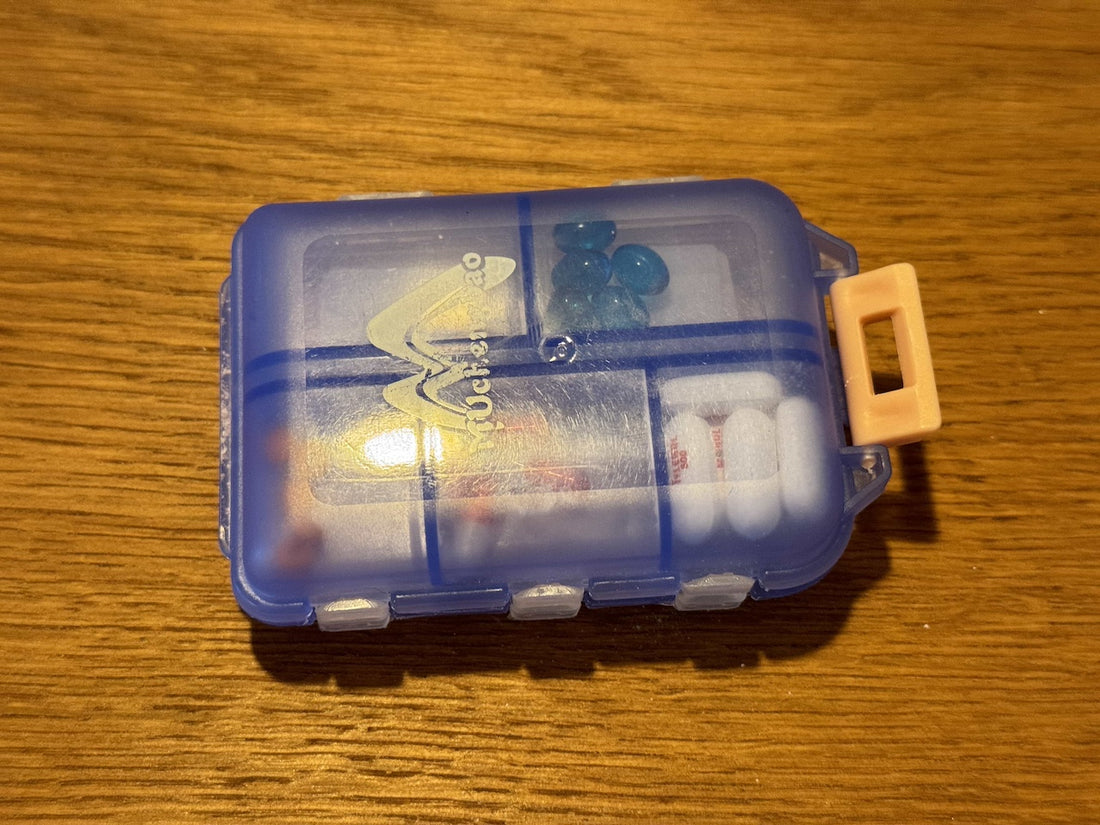When traveling, we all know that shit can happen. Literally and figuratively. That's why this medicine holder can really come in handy.
The author used to always travel with meds, but they ended up generally getting shoved into a gallon bag and checked under the plane. Not really the best idea, especially if you need them when moving around the airport or, even worse, on the plane for a long flight. It seems as well that due to the lack of organization, medications would expire, and basically, it would be useless. On a recent trip, it happened again, and it was time to create a new system.
Enter the travel medicine holder. It's very small and compact and easily fits in a toiletry kit (which I always keep in my carry-on). It's very secure when it is locked and holds ten different medications. I choose to only use over-the-counter meds in here, but I am certain this would be really nice for someone with health concerns and medications to go with them. The kit comes with simple stick-on labels. It also comes with stickers that have numbers or days of the week if you so require this. The author carries the following medications with him, and had the list reviewed by a friendly ER Physician to ensure I did not miss any that could come in handy.
It's important to note the following does not constitute medical advice, and you should consult your physician before taking any or all of these drugs. You should evaluate your own needs and considerations and add or remove medications that fit your life. It's also important to note that you need to be reading the product labels before using any of these drugs and also need to understand that with a physician you need to check if medications are compatible when taking them together.

Tylenol - The active ingredient in Tylenol is acetaminophen, also known as paracetamol. It primarily works by reducing pain signals in the brain. This is great for headaches.
Advil - The active ingredient in Advil is ibuprofen, which belongs to the class of nonsteroidal anti-inflammatory drugs (NSAIDs). Ibuprofen works by reducing inflammation, relieving pain, and lowering fever. This is great for any bump or bruise and hitting physical activity hard.
With proper guidance from a physician, when you're really hurting, you can take both together to really help yourself out.
Tylenol PM - A combination medication that contains two active ingredients: acetaminophen and diphenhydramine. It relieves pain by reducing pain signals in the brain but also has an antihistamine that has some sedative properties making you a little drowsy and promoting sleep. It also helps promote restful sleep. This is great when you have an annoying noise that prevents you from sleeping or have a big day you're anxious about and really want a good night's sleep to crush it.
Tums - The active ingredient is calcium carbonate. Relieves heartburn, acid indigestion, and sour stomach. It does this by neutralizing stomach acid. This is great stomach settler when overindulging and works quickly.
Pepto-Bismol - The active ingredient is bismuth subsalicylate. It relieves upset stomach, nausea, heartburn, indigestion. It coats the stomach lining which can help protect it from further irritation. It also provides diarrhea relief by slowing down the intestines and removing excess fluid in the digestive tract, reducing the frequency and liquidity of stools. It's good for gas, bloating, and provides relief for "traveler's diarrhea" from eating contaminated food or drink. This is great when you are getting after it with food or booze or have something going on with your stomach you don't have the ability to deal with immediately (i.e., on a plane).
Imodium - The active ingredient in Imodium is loperamide, which works by slowing down the movement of the intestines and reducing the frequency and liquidity of bowel movements. It helps control diarrhea by affecting the muscles of the intestines, slowing down their contractions. It reduces the frequency or urgency of bowel movements. It reduces abdominal cramps. Most importantly, if you're REALLY sick, it can help your body absorb fluids and electrolytes which can help prevent dehydration when very sick. This is great when things are bad. You've got a bug and can't leave a toilet and need to. This can help slow things down enough to get some water back into your system.
Gentle laxative - Helps stimulate bowel movements and promote regularity. It relieves constipation and softens stools and helps restore regularity. This is great when you spend all day traveling, not drinking enough water, and have a big trip planned. When properly rehydrated, this can be enough to get you moving regularly on a trip. It also is not super strong to a point it will make you shit your pants.
NyQuil - It is a combination medication that typically contains several active ingredients, including acetaminophen (a pain reliever and fever reducer), dextromethorphan (a cough suppressant), doxylamine succinate (an antihistamine with sedative properties), and sometimes phenylephrine (a decongestant). It relieves cold and flu symptoms, reduces pain and fever, suppresses coughing, induces sleep, and provides relief from nasal congestion. This is great when you're sick with a cold and flu and need some help recovering at night.
Allegra - A medication containing fexofenadine. It helps alleviate allergy symptoms. It is non-drowsy and long-lasting. This is great if you get off the plane and notice that you might be allergic to something in the area you're not used to in your old area. It does a good job at keeping allergy symptoms at bay all day.
Benadryl - An antihistamine medication containing diphenhydramine. It is good at relieving allergy symptoms, especially if reacting very badly to something. It also can help with sleep due to it causing drowsiness. It provides itch relief from things such as insect bites, allergic reactions, or skin irritations. This is great when you're reacting really badly to something and need some immediate relief.
Of course, this is a non-exhaustive list, and there always is something else you may want to take with you. This list is meant to help with the most common issues. Like my old system (a gallon bag filled with different medications), having too much can be worse than not having enough because you either can't find them, they become expired, or you don't take them because it's too big.
An important aspect of this system is writing down what the medications are and when they expire on the container. If you don't know what the medications are or if they are expired, they are of no use to you.
A word of caution: when you throw medications in this fashion into the container, it may be a good idea when traveling internationally to verify that the medications are indeed legal in the country you are going to. Often in many states, it is illegal for you to store prescription medication outside of the container in which they are prescribed.
It's important to note that many people are hesitant to take medications. The author can understand this sentiment, but the reality is that these drugs help and alleviate suffering. When on a trip, especially, it makes sense to utilize these drugs to focus on what you traveled for. It makes the trip enjoyable for both you and those you traveled with. The bottom line is - if you're hurting, just take the damn meds and feel better. There are a lot of situations when toughing it out can be good, but generally on trips, it's not worth it because there are a lot of other amazing things to focus on.
It also needs to be said that there are legitimate scenarios that these medications could actually help you save your life or at a minimum make a horrible situation a little bit better. At a minimum, they can help alleviate suffering and help you get back to what you want to do.

